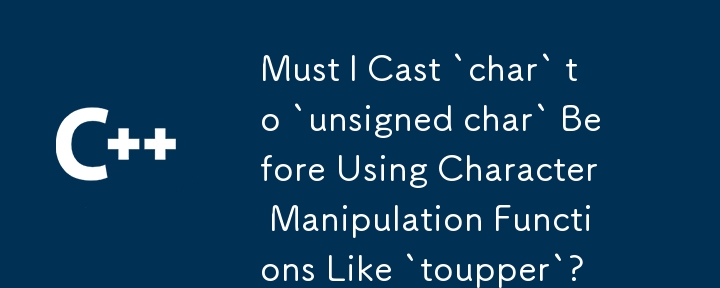Home >Backend Development >C++ >Must I Cast `char` to `unsigned char` Before Using Character Manipulation Functions Like `toupper`?
Must I Cast `char` to `unsigned char` Before Using Character Manipulation Functions Like `toupper`?
- Barbara StreisandOriginal
- 2025-01-04 12:31:41312browse

Do I Need to Cast to unsigned char Before Calling Char Manipulation Functions?
Question:
Despite conflicting information online, is it necessary to explicitly cast char values to unsigned char before invoking functions like toupper, tolower, and their counterparts?
Answer:
Yes, casting to unsigned char is mandatory to avoid undefined behavior.
Explanation:
char, signed char, and unsigned char are distinct data types. While char may map to either signed char or unsigned char, its representation and range vary accordingly.
The toupper function expects an int argument and returns an int value. According to the C standard, the argument must be representable as an unsigned char or have the value of EOF (-1). If either condition is not met, undefined behavior occurs.
In C , char can be used in string indices and comparisons. However, if char is signed and the value is negative, invoking toupper directly with the char argument results in undefined behavior.
For example, in the following code:
char c = -2; c = toupper(c); // undefined behavior
Passing a negative value to toupper exceeds the bounds of the lookup table typically used for implementation.
Explicitly casting char to unsigned char ensures that the implicit conversion to int does not produce a negative value, eliminating the risk of undefined behavior.
Note that casting to unsigned alone does not prevent the issue because int can represent a wider range of values than unsigned char. Converting a negative char to unsigned produces a large positive value that may still fall outside the acceptable range for toupper.
The above is the detailed content of Must I Cast `char` to `unsigned char` Before Using Character Manipulation Functions Like `toupper`?. For more information, please follow other related articles on the PHP Chinese website!
Related articles
See more- C++ compilation error: A header file is referenced multiple times, how to solve it?
- C++ compilation error: wrong function parameters, how to fix it?
- C++ error: The constructor must be declared in the public area, how to deal with it?
- Process management and thread synchronization in C++
- How to deal with data splitting problems in C++ development

